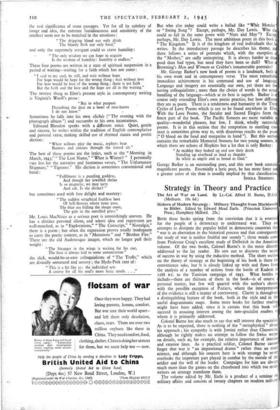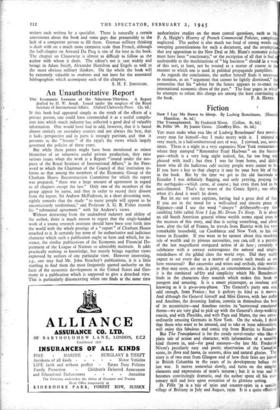Strategy in Theory and Practice
The Art of War on Land. By Lt.-Col. Alfred H. Burne, D.S.O (Methuen. 10s. 6d.) Makers of Modern Strategy : Military Thought from Machiavel to Hitler. Edited by Edward Mead Earle. (Princeton Universi Press; Humphrey Milford. 25s.) BOTH these books spring from the conviction that it is essenua for the people of a democracy to understand war. They are attempts to dissipate the popular belief in democratic countries tha " war is an aberration in the historical process and that consequent( the study of war is neither fruitful nor seemly "; these words co from Professor Craig's excellent study of Delbriick in the America volume. Of the two books, Colonel Burne's is the more direct( addressed to the lay reader. He sets out to discover the secre' of success in war by using the inductive method. The short sectio' on the theory of strategy at the beginning of his book is there f' convenience sake, but 'it is closely linked up with and flows fro the analysis of a number of actions from the battle of Kadesh 1288 B.c. to the Tunisian campaign of 1943. What battles t' include—there are thirteen of them in the book—is of course personal matter, but few will quarrel with the author's choic with the possible exception of Poitiers, where the interpretatio' of the evidence is still a matter of controversy. Clarity is throughou a distinguishing feature of the book, both in the style and in the useful diagrammatic maps. Some more books for further readin might have been added, since it is certain that this book will succeed in arousing interest among the non-specialist readers to whom it is primarily addressed.
Colonel Burne has also much to say that will interest the specialist. As is to be expected, there is nothing of the " metaphysical " about his approach ; his sympathy is with Jomini rather than Clausewitz, although he rightly makes no attempt to follow the Swiss writer on details, such as, for example, the relative importance of interior and exterior lines. As a practical soldier, Colonel Bume cannot forget that war is " an impassioned drama " rather than an exact science, and although his concern here is with strategy he never overlooks the important part played in combat by the morale of the soldier and the will of the leader. Campaigns for him are always much more than the games on the chessboard into which too many writers on strategy transform them.
The volume edited by Mr. Earle is a product of a seminar 06 military affairs and consists of twenty chapters on modern military
writers each written by a specialist. There is naturally a certain unevenness about the book and some gaps due presumably to the lack of a competent person to fill them. German military thinking is dealt with on a much more extensive scale than French, although the half-chapter on Armand Du Picq is one of the best in the book. The chapter on Clausewitz is almost as difficult to follow as the author with whom it deals. The editor's net is cast widely and brings in Adam Smith, Alexander Hamilton and Engels as well as the more obvious military thinkers. On the whole the book will be extremely valuable to students and not least for the annotated bibliographies which accompany each of the chapters.
S. H. F. JOHNSTON.



























 Previous page
Previous page